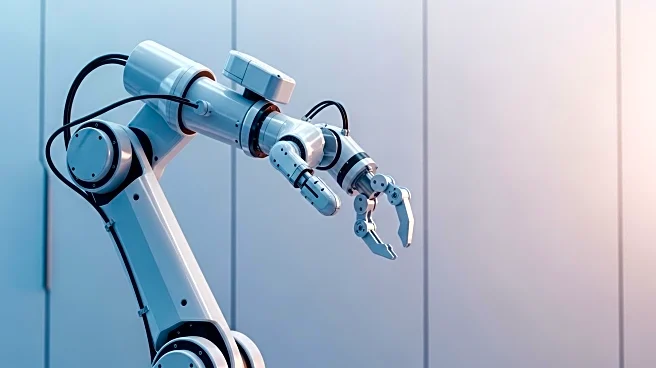What's Happening?
Microbot Medical Inc. has received FDA 510(k) clearance for its LIBERTY Endovascular Robotic System, marking a significant milestone for the company. This clearance allows Microbot Medical to commercialize the LIBERTY system in the U.S., targeting approximately 2.5 million peripheral endovascular procedures annually. The LIBERTY system is the first FDA-cleared single-use, remotely operated robotic system designed for these procedures. The company aims to transform the field by providing access to advanced robotics without the need for traditional capital equipment and infrastructure. The pivotal study for LIBERTY demonstrated 100% success in robotic navigation and zero device-related adverse events, along with a 92% reduction in radiation exposure for physicians.
Why It's Important?
The FDA clearance of the LIBERTY system is poised to significantly impact the healthcare industry by enhancing procedure efficiency, reducing costs, and improving the quality of care. The system's remote design is expected to alleviate physical strain on healthcare providers, potentially leading to better ergonomics and reduced fatigue. This development could also drive innovation in robotic-assisted medical procedures, offering a cost-effective solution that expands access to advanced technologies. As Microbot Medical moves towards commercialization, the healthcare sector may see a shift towards more robotic-assisted interventions, potentially improving patient outcomes and operational efficiencies.
What's Next?
Microbot Medical is preparing for the commercial launch of the LIBERTY system in Q4 2025, with plans to penetrate the U.S. market and explore global opportunities. The company will continue collecting clinical data during the launch to further validate the system's benefits. Microbot Medical's CEO, Harel Gadot, will present at the H.C. Wainwright Annual Investor Conference, providing insights into the company's strategy and future plans. Stakeholders, including investors and healthcare providers, will be closely monitoring the system's market entry and its impact on the industry.
Beyond the Headlines
The introduction of the LIBERTY system may prompt discussions on the ethical implications of robotic-assisted medical procedures, particularly concerning patient safety and the role of human oversight. Additionally, the system's success could influence regulatory pathways for future robotic technologies, potentially easing the approval process for similar innovations. As the healthcare industry adapts to these advancements, there may be broader cultural shifts towards acceptance and reliance on robotic systems in medical settings.









